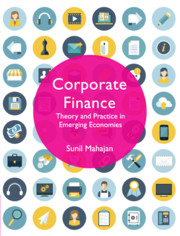Book contents
- Frontmatter
- Contents
- List of Figures
- List of Tables
- List of Corporate Snippets
- List of Abbreviations
- Preface
- Acknowledgements
- 1 Corporate Finance: A Conceptual Introduction
- 2 Financial Markets
- 3 The Time Value of Money
- 4 Capital Budgeting
- 5 Risk and Return
- 6 Valuation
- 7 Capital Structure and Financing
- 8 Dividend Payout: Policy and Practices
- 9 Leverage
- 10 Financial Derivatives
- 11 International Finance
- 12 Working Capital
- 13 Ratio Analysis
- Appendix
- Bibliography
- Index
12 - Working Capital
Published online by Cambridge University Press: 30 April 2020
- Frontmatter
- Contents
- List of Figures
- List of Tables
- List of Corporate Snippets
- List of Abbreviations
- Preface
- Acknowledgements
- 1 Corporate Finance: A Conceptual Introduction
- 2 Financial Markets
- 3 The Time Value of Money
- 4 Capital Budgeting
- 5 Risk and Return
- 6 Valuation
- 7 Capital Structure and Financing
- 8 Dividend Payout: Policy and Practices
- 9 Leverage
- 10 Financial Derivatives
- 11 International Finance
- 12 Working Capital
- 13 Ratio Analysis
- Appendix
- Bibliography
- Index
Summary
In God we trust. All others must pay cash.
—Anonymous1. The financial crisis in 2008 caught many companies off guard. They were unprepared for the subsequent recession in the global economy. The large dip in demand severely impacted many companies. Metal manufacturers suffered more than others. Facing a grim future,
the global aluminum company Alcoa made working capital a priority in 2009 in response to the financial crisis and the global economic downturn, and it recently celebrated its 17th straight quarter of year-on-year reduction in net working capital. Over that time, the company has reduced its net working capital cycle—the amount of time it takes to turn assets and liabilities into cash—by 23 days and unlocked $1.4 billion in cash (Davies and Merin, 2014)
2. Fisher-Price Inc.'s 1991 Annual Report stated, ‘The decision to maintain higher inventories was taken to allow Fisher-Price to aggressively support first quarter sales and to further improve our quality of customer service.’
There is a glaring contrast in the working capital policy adopted by the two companies. Alcoa was faced with a tough, recessionary environment where cash was at a premium. Lower demand and a lack of pricing power resulted in poor cash flow from operations and the profit and loss (P&L) account. Alcoa sought to squeeze maximum cash from its balance sheet through the efficient management of the working capital.
Fisher-Price, on the other hand, was operating in a flourishing environment with booming demand and large cash flows from business. The company needed to ensure that its efforts to achieve higher sales were not stymied by inventory constraints and that its working capital was supportive of its aggressive sales strategy. The company had to ensure that there was no let-up in production and that the stocks of the finished products were available to support sales and customer service.
Like other aspects of financial policy, working capital policy must be in consonance with the business strategy of a company. Different business environments and strategies demand different working capital support. It is important to understand the business strategy of the firm and how working capital dovetails in and plays a part in the success of the strategy.
- Type
- Chapter
- Information
- Corporate FinanceTheory and Practice in Emerging Economies, pp. 283 - 298Publisher: Cambridge University PressPrint publication year: 2020



